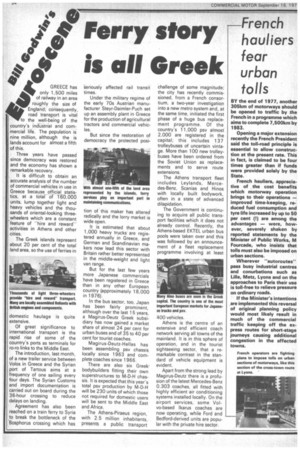Ferry story is all Greek
Page 56

If you've noticed an error in this article please click here to report it so we can fix it.
GREECE has only 1,500 miles of railway in an area roughly the size of England; consequently, road transport is vital to the well-being of the country's industrial and commercial life. The population is nine million, although the is lands account for almost a fifth of this.
Three years have passed since democracy was restored and the economy has shown a remarkable recovery.
It is difficult to obtain an accurate analysis of the number of commercial vehicles in use in Greece because official statistics, at a totalOT 160,000 units, lump together light and heavy vehicles and the thousands of oriental-looking threewheelers which are a constant feature of "hire and reward"' activities in Athens and other cities.
The Greek islands represent about 20 per cent of the total land area, so the use of ferries in domestic haulage is quite extensive.
Of great significance to international transport is the rapid rise of some of the country's ports as terminals for ro-ro links to the Middle East.
The introduction, last month, of a new trailer service between Volos in Greece and the Syrian port of Tartous aims at a frequency of one sailing every four days. The Syrian Customs and import documentation is carried out on board during the 36-hour crossing to reduce delays on landing.
Agreement has also been reached on a train ferry to Syria to break the bottleneck of the Bosphorus crossing which has seriously affected rail transit times.
Under the military regime of the early 70s Austrian manufacturer Steyr-Daimler-Puch set up an assembly plant in Greece for the production of agricultural tractors and commercial vehicles.
But since the restoration of democracy the protected posi tion of this maker has altered radically and the lorry market is wide open.
It is estimated that about 1,000 heavy trucks are registered annually in Greece, and German and Scandinavian makers now lead this sector with Britain rather better represented in the middle-weight and light van range.
But for the last few years more Japanese commercials have been registered in Greece than in any other European country (approximately 18,000 in 1976).
In the bus sector, too, Japan has been fairly prominent,
although over the last 15 years, a Magirus-Deutz Greek subsi
diary has now gained a market share of almost 24 per cent for urban buses and of 35 to 40 per cent for tourist coaches.
Magirus-Deutz-Hellas has been assembling psv chassis locally since 1963 and complete coaches since 1966.
There are also six Greek bodybuilders fitting their own superstructures to M-D-H chas sis. It is expected that this year's total psv production by M-D-H will be 230 units of which those not required for domestic users will be sent to the Middle East and Africa.
The Athens-Piraeus region, with 2.5 million inhabitants, presents a public transport
challenge of some magnitude; the city has recently commissioned, from a French consortium, a two-year investigation into a new metro system and, at the same time, initiated the first phase of a huge bus replacement programme. Of the country's 11,000 psv almost. 2,000 are registered in the capital; this includes 137 trolleybuses of uncertain vintage. More than 100 new trolleybuses have been ordered from the Soviet Union as replacements and to serve route extensions.
The Athens transport fleet includes Leylands, Mercedes-Benz, Scanias and Hinos with locally built bodywork, often in a state of advanced dilapidation.
The Government is continuing to acquire all public transport facilities which it does not already control. Recently, the Athens-based EKTEL urban bus pools were taken over and this was followed by an announcement of a fleet replacement programme involving at least 400 vehicles.
Athens is the centre of an extensive and efficient coach network serving all towns of the mainland. It is in this sphere of operation, and in the tourist sightseeing sector, that a remarkable contrast in the standard of vehicle equipment is evident.
Apart from the strong lead by Magirus-Deutz there is a profusion of the latest Mercedes-Benz 0.303 coaches, all fitted with highly efficient air conditioning systems installed locally. On the airport services, some Volvo-based lkarus coaches are now operating, while Ford and Bedford-derived units are popular with the private hire sector.
































































































































